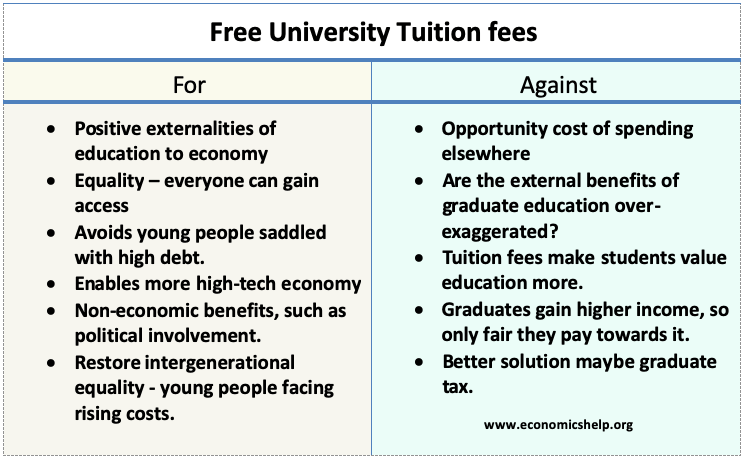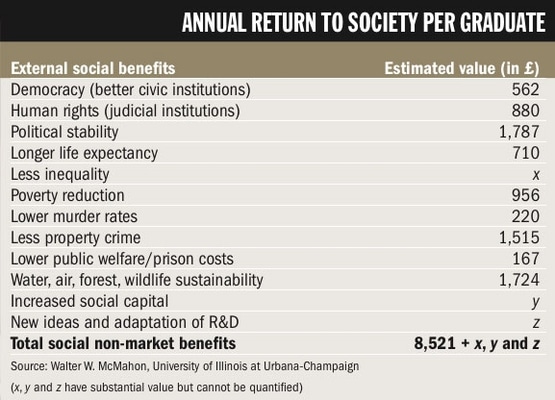Summary
Education has positive benefits for the rest of society. If university education is left to market forces, there may be under-provision, and the economy may suffer from a lack of skilled graduates. Furthermore, in a free market, higher education would become the preserve of wealthy families who can afford to send their children to university. Therefore there is a strong case for the government providing higher education free at the point of use.

However, others argue the positive externalities of higher education are limited, and the prime beneficiaries of a university degree are the graduates who can command a higher paying job. If the external benefits of many degrees are limited, government spending may be misallocated in offering relatively expensive university education. Rather than fund 3-4 year university degrees, governments may be able to get a better return from spending money on primary education and vocational training – training which is more relevant to the needs of the economy.

More details
In recent years, the UK government has sought to increase the amount students pay for studying at university. In the UK, the government have phased out grants and introduced top-up fees. With tuition fees and rising living costs, students could end up paying £50,000 for a three-year degree, and leave university with significant debts.
Some argue this is a mistake. Charging for university education will deter students and leave the UK with a shortfall of skilled labour – and arguably this will damage the long-term prospects of the UK economy. Furthermore, charging to study at university will increase inequality of opportunity as students with low-income parents will be more likely to be deterred from going to university.
Arguments for free university education
- Positive externalities of higher education. Generally, university education does offer some external benefits to society. Higher education leads to a more educated and productive workforce. Countries with high rates of university education generally have higher levels of innovation and productivity growth. Therefore, there is a justification for the government subsidising higher education.
- Equality. There is also a powerful argument that university education should be free to ensure equality of opportunity. If students have to pay for university education, this may dissuade them. In theory, students could take out loans or work part-time, but this may be sufficient to discourage students from studying and instead may enter the job market earlier.
- Increased specialisation of work. The global economy has forced countries, such as the UK to specialise in higher-tech and higher value-added products and services. The UK’s biggest export industries include pharmaceuticals, organic chemicals, optical and surgical instruments, and nuclear technology (see: what does the UK produce?). Therefore, there is a greater need for skilled graduates who can contribute to these high-tech industries.
- Education is a merit good. One characteristic of a merit good is that people may underestimate the benefits of studying and undervalue higher education. Government provision can encourage people to study.
- Young people facing rising costs. In recent years, we have seen a rise in the cost of living. House prices and rents have risen faster than inflation. This means young people are struggling to meet living costs – even in work. The thought of student debt on top of high living costs, may dissuade people from studying. Free tuition fees is a way to restore the income inequality across generations.
- Non-economic benefits of education. It is tempting to think of university education in purely monetary terms. But graduates can also gain skills and awareness of civic institutions which offer intangible benefits to society.
Source: Times Higher Education
Higher Learning, Greater Good: The Private and Social Benefits of Higher Education (2009) Professor McMahon examined the “private non-market benefits” for individuals of having degrees.
This includes better personal health and improved cognitive development in their children, alongside the “social non-market benefits”, such as lower spending on prisons and greater political stability.
- If you wished to evaluate this point, we could ask – is it university education which causes these civic virtues or is it because university education is dominated by middle classes who are more likely to have better health e.t.c. already?
Arguments against free university education
- Opportunity cost. If we spend billions on free university education, there is an opportunity cost of higher taxes or less spending elsewhere. Arguably, there is a greater social benefit from providing vocational training – e.g. so people could become plumbers, electricians e.t.c. There is often a real shortage of these skills in an economy. The UK Commission for skills and education report significant skills shortages in the basic ‘core generic skills’ such as literacy, numeracy and communication skills. These skill shortages are prominent in industries like building, health care, plumbing, social care and construction. The problem is not a shortage of graduates with art degrees, but a shortage of lower-level vocational skills. (See: BBC – skills shortage in the UK) Therefore, there is a case for charging students to study at university – allowing higher public spending to tackle more basic skill shortages.
- Do we have too many graduates? In recent decades there has been a rapid rise in the number of graduates. But many graduates are now leaving university to take jobs which don’t require a degree. A study by the ONS found that nearly 50% of workers who left university in the past five years are doing jobs which don’t require a degree. (Telegraph link) Therefore, it is a mistake to continue to fund the public expansion of university education because the economy doesn’t need more graduates as much as other vocational skills.
- Higher quality of education. The rapid rise in university numbers means that greater pressure is being put on university resources. Since the government is struggling to increase real spending, there is a danger that university education and research may suffer, causing UK education to lag behind other countries. If universities can charge students, it will help maintain standards, quality of teaching and the reputation of UK universities.
- Makes people value education more. If people have to pay to go to university, you could argue that they would value education more. If higher education is free, it may encourage students to take an easy three years of relaxation.
- Signalling function of higher education. Arguably, higher education acts as a signal to employers that graduates have greater capacity. As a consequence, people who gain a degree, end up with a relatively higher salary. Therefore, if they financially gain from studying at university, it is perhaps fair they pay part of the cost. This is especially important for middle-class families, who send a higher proportion of people to higher education.
Another issue is whether we need 50% of 18-year-olds to go to university. The increase in student numbers is a significant contributory factor to the increased financial pressures on universities. Rather than encouraging students to automatically go to university (as some schools do), it may be better to encourage more students to take vocational training and avoid three years of academic study. If less went to university, it would mean the cost per student would be relatively lower.
Another issue is how do you charge students for going to university? If students leave university with large debts, this has negative consequences. But, if we finance university education through a graduate tax paid when graduates get a decent income then it may be less of a disincentive.
Abolition of Tuition Fees
In the 2017 and 2019 election, the Labour party proposed to abolition tuition fees. This is estimated to cost £16 billion.
Related


In my perceptive the government must allow free education system for two category only. One is the children comes merited and secondly for lower class people
Aka free collage to welfare state
Dear Tejvan Pettinger,
You misspelled Subsidizing*
Sincerely,
The E-Time Guy
Subsidizing is American-English spelling. But I use British-English ‘subsidising’
I don’t think you realised/realized that EconomicsHelp is a British-founded website.
Lmao! He must have felt well chuffed with himself…until you pointed that out!
Wouldn’t it be hard to manage that sort of, uh, selection?
Just give everyone a free college degree. No debts, no tax dollars to send Timmy off for free 4 years of living. Free college = tax payer pays to get more competition for his job.
Free college = college degree is pointless cause everyone has one
i agree.
The best way is to offer relatively large number of places free of charge, for instance, 80% of overall demand in the economy to be free/state paid places.
The entrance competition must be held to get the place.
The rest will be private places.
Erm..we just that read that…but I guess thanks for repeating it…
I agree that education improves how productive people are in the workforce. A friend of mine is majoring in computer science and they are much more adept because of what they are learning. If governments cannot offer compensation for education then I hope that companies will.
Education has positive benefits for the rest of society. If university education is left to market forces, there may be under-provision, and the economy may suffer from a lack of skilled graduates. Furthermore, in a free market, higher education would become the preserve of wealthy families who can afford to send their children to university. Therefore there is a strong case for the government providing higher education free at the point of use. However, others argue the positive externalities of higher education are limited, and the prime beneficiaries of a university degree are the graduates who can command a higher paying job. If the external benefits of many degrees are limited, government spending may be misallocation in offering relatively expensive university education. Rather than fund 3-4 year university degrees, governments may be able to get better return from spending money on primary education and vocational training – training which is more relevant to the needs of the economy.
plagiarized from another article but great response (next time cite)
Great post and interesting argument here. I have to say that with everything there is going to be advantages and disadvantages. If you offer free university education, it will devalue those who already have a university education. I think if there is a plan to offer free university education, then there needs to be guidelines around it – such as certain state schools, specific courses, etc.
Sorry, I’m not so sure I understand what you mean by “devalue” here. I think university is an opportunity and surely the value in an opportunity is in what you gain out of it, not its availability?
“devalue” as towards the degree itself, not the user. The more of anything (“degrees”) lowers the value, supply and demand.
I’m a pretty lefty guy (51. Male, UK) but this one I’m not for, students seem to think degree courses were free before the fees were started under Tony Blair, they wernt, I applied and was refused due to my grade not being good enough. Only a set number of people were given grants. Now after working my way up the slippy pole, I would feel cheated if I have to pay extra tax for someone else to go to Uni. However it this was fully funded from a wealth tax (which I would not pay as I dont have much wealth), then yer go on do it.
I think the university fees should not be free. Maybe exceptions can be made for students from more poor backgrounds and they pay lesser fees but it should not be free because then there is no point.
No one would take it seriously anymore & if u paid for something you value it more and work harder
You should work hard for something you want and not expect everything to be handed on a silver plater
It’s not being handed on a silver plate – you still have to work to be accepted and work to graduate. Making uni free doesn’t devalue its certification.
I totally agree when you said that it would be hard for low-income parents to send their children to universities. This is the actual problem of my cousin which is why he is lucky that his dad is a military because there might be assistance for them. I will suggest this to them since they might not be aware, and he will be going to college in two years time.
all the Arguments against free university education written here are silly and nothing to do with how things work in real life, you can see it in all quality countries that have free tertiary education, like in northern europe.
or in any other europe country, you can check it out.
I don’t get the argument about too many people going to university and getting a degree? Or am I the thick one here?
We’re not handing out free degrees, we’re giving everyone an equal OPPORTUNITY to get a degree, and a higher education for their future. So many people would’ve made very useful citizens had they have had a chance to fully develop their skills, and we forget that making uni free doesn’t make it any easier to get into and to graduate from.
Making uni free doesn’t devalue its certification btw
Very interesting, good job and thanks for sharing such a good blog.
Everyone grows up going to school and unless it is a private school, the government funds it once we enroll and all we need to do is show up. Once we graduate high school or get a GED, suddenly the price for a good quality education sky rockets and everyone starts scrambling to find a job, or get as many grants, scholarships, and loans as they possibly can to cover the ever growing debt most people will have once they graduate college. The debate on whether or not to make college free or at least more affordable has grown, and more and more people including politicians are looking for ways to make this happen. With every good idea there will be problems that are solved, but new ones will arise. Some reasons people want college level education to be free is it will give everyone a chance for education past high school, it avoids student debt, and it was free when they first made colleges, but the downfalls might include raised taxes, a sacrifice of standards, and financial irresponsibility from the students.
Most of the people that attend college are from wealthier families because they are able to pay the bill. When colleges were first made, they were all actually free due to the lack of students and establishments under the Morrill Act of 1862 (Beelineweb.com et al.). This act allowed colleges to be created by the state on federal lands to make a higher education system available to all who desired it regardless of class or income. Now the sum that these schools require is absolutely outrageous. Even the wealthy are not able to afford quality education without taking out a loan. With all the loans, people are acquiring more and more debt, but without the cost of tuition, that debt would decrease dramatically (Pettinger). Many people that need loans currently, would be able to attend and get a quality education without worrying about the debt that will follow them for a long time. Along with that, more people that are not able to go to college now will be able to attend just because they want to instead of forgetting about college as even an option because it costs an arm and a leg (Ayres). Free college education would open many doors that have been shut due to financial struggles. With all the good that would come from free college level education, there are quite a bit of issues that might arise with it.
Although free college-level education might seem great, there quite a few things that would be sacrificed with the elimination of tuition costs. With the sacrificed costs, some of the quality of education might be sacrificed as well (Ayres). Without the constant funds coming in from the enrolled students, the facilities might go a while without very necessary updates and repairs. There is always going to be a need for money to pay for all the things colleges provide and if students are not paying for it, the costs would shift from being a personal expense to a societal expense (Beelineweb.com et al.). The reality for everyone would be the increase of taxes to cover the necessary costs. Students would have their tuition covered by the government issued taxes. Without the need for loans, students might lose their financial responsibility because they will not have needed to manage their money to pay for their classes and take their education for granted (Amit Kumar). Some might actually devalue their diploma because they did not pay for the classes. The diploma would have the same value as a high school diploma.
Although these things are factors that need to be considered, having education that is at least partially free would be good to allow more people to get the opportunity for getting a better education. Hopefully we will be able to find a way where we are able to go back to when colleges were first made, give everyone an equal opportunity for their education, and avoid debt, but also avoid some of the downfalls from taxes, sacrificed standards, and financial irresponsibility.